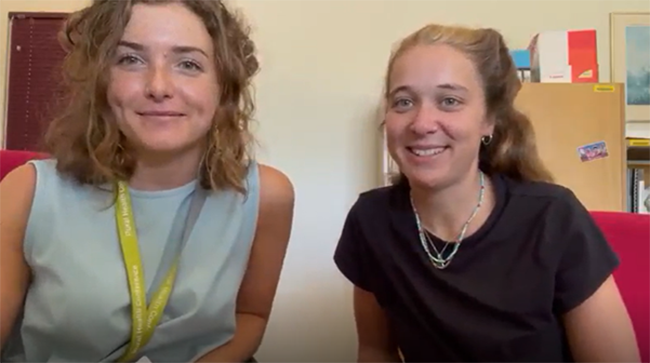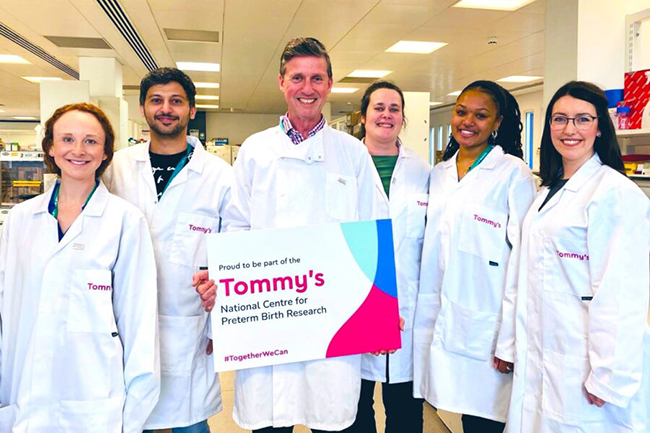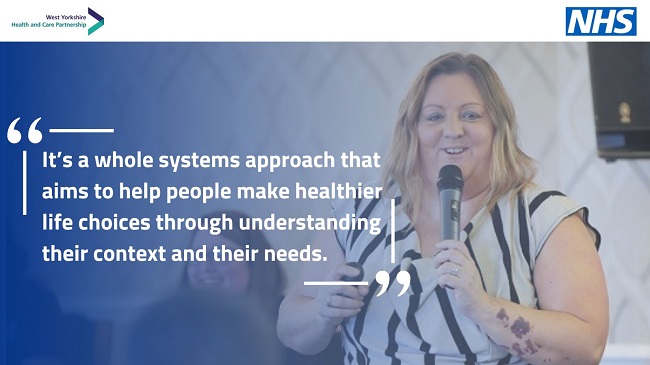 Hello, my name is Rachel.
Hello, my name is Rachel.
I am acting Consultant in Public Health in the Improving Population Health team, part of the Strategy and Transformation Directorate at West Yorkshire ICB. I lead on tobacco control for West Yorkshire, taking a whole system approach. System leadership is something that I really enjoy and is one of my strengths. I joined the team in November and am working with colleagues from across the system to create a smokefree West Yorkshire.
Addiction
Back in 2007, I would never have dreamed I would work on tobacco control. I was living in Fuerteventura, working in customer service, and smoking over 40 cigarettes a day. Despite my low wages, smoking was incredibly cheap and easily affordable. It was also something everybody did. Every shop had a poster for a different brand, there was vast availability, it was cheap and normalised – the tobacco industry’s dream circumstances.
When I moved back to England, the smoking ban had been implemented. Nobody smoked inside anymore, and it wasn’t pleasant standing out in the rain. Most of all – smoking was expensive. I eventually quit a year after I returned and am happy to say I have been more or less smoke free since then (with the odd holiday relapse - the hold of the addiction is strong, even 15 years later).
A key driver of health inequalities
In West Yorkshire, there are around 252,000 adults who smoke (this is around 13.1%), which is higher than the national average. Smoking is a key driver of health inequalities and is responsible for half of the difference in healthy life expectancy between the least and most deprived areas in West Yorkshire. We do not know the extent of children and young people who smoke or vape – but we do know that this is a big problem. Nicotine is addictive. Tobacco is extremely harmful. The tobacco industry takes away the choice of children. It certainly took mine away. I was 16 when I started smoking. I thought it was cool and I wanted to fit in, thanks to the tobacco industry’s promotional and advertising tactics directed at people like me. Similar tactics to purposefully market products to children are still used today, and we are seeing this with the rise of youth vaping. Thankfully, I quit smoking at age 22, so I am hoping that I didn’t do too much damage to my lungs. Some people are not that lucky and are caught in the grip of an addiction to a product that kills up to two in three people who smoke tobacco.
My journey to public health
My story of moving from customer service to public health would probably fill a book. I’ll stick to the highlights. Put simply, I want to make things better and tackle injustice. My journey started by going to university to study psychology as a mature student (at the grand old age of 25). In my final year, I got a job with NHS Employers working to improve the uptake of staff flu vaccination. After a couple of years, I moved to Public Health England as screening and immunisation coordinator. Keen to learn more about public health as a discipline I did my Master of Public Health at the University of Sheffield. Within a couple of months, I knew that this was the career for me. After successfully applying to the public health specialty training programme, here I am! I am near to completing my training and will receive my certificate in September this year. As a last placement before I qualify, the Partnership has been perfect.
Tobacco Control Alliance
Working with colleagues from across the system, I have established the West Yorkshire Tobacco Alliance. At the first meeting in March, you could feel the huge passion and energy in the virtual room. I feel incredibly proud to be part of this work with such an enthusiastic and dedicated group of people. Working together we are:
- Implementing the NHS Long Term Plan funded tobacco dependency treatment pathways
- Extending tobacco dependency treatment into the Huddersfield Royal Infirmary emergency department
- Dedicating financial investment from CORE20PLUS5 funding
- Coordinating a system-wide ‘swap to stop’ scheme, making £1.9million worth of vape starter kits available to people in West Yorkshire
- Reducing the availability of illicit tobacco in West Yorkshire, working with West Yorkshire Trading Standards
- Exploring mass media opportunities
The benefits
Reducing rates of smoking in West Yorkshire supports many of our big ambitions and our work to reduce health inequalities, including:
- Increasing the years of life that people live in good health
- Reducing social isolation and loneliness
- Reducing stillbirths and neonatal deaths
- Reducing the gap in life expectancy between people with mental health conditions, learning disabilities or autism and the rest of the population
- Supporting sustainability efforts by reducing waste associated with smoking
- Strengthening our local economy by preventing more people becoming unable to work through smoking related ill health
- Stopping smoking also has huge potential to reduce future emergency admissions and relieve some of the NHS winter pressures:
- After a year of quitting, your risk of admission because of a heart attack reduces by 67%
- Research into hospital initiated quit smoking programmes shows that the relative risk of readmission and A&E attendance reduces by 6% and 3% respectively at year one
- Cardiovascular disease (CVD) mortality reduces by up to 45% at five years in sustained quitters versus smokers (with a 32% reduction in all-cause mortality)
- Between five and 15 years, the risk of stroke and coronary heart disease is ‘normalized’ to that of someone who has never smoked
- Smoking is a key risk factor in chronic obstructive pulmonary disease (COPD) exacerbations and hospitalisations. Comparing smokers to ex-smokers over a five-year period demonstrated a reduced risk (16%) of exacerbation in ex-smokers compared to smokers
- Self-reported smoking cessation is associated with a reduction in the risk of COPD morbidity of approximately 40%
- Lung function improves in two-12 weeks
- The risk of death from lung cancer is over two times less common in sustained quitters compared to smokers at 15 years
We must achieve a smokefree West Yorkshire to protect people’s health. We must show people the tactics used by the tobacco industry to keep them addicted and take away their choice – as well as those aimed at getting children to start smoking.
We are all leaders. By working together, we can make a difference.
For more information, or to get involved, please contact rachel.
Thanks for reading,
Rachel


 The NHS Global Fellowship Programme has been on offer for nearly 15 years, and in that time, more than 350 NHS staff have undertaken fellowships abroad, many of whom have returned to the UK and drawn on their global health skills to become senior leaders across the NHS.
The NHS Global Fellowship Programme has been on offer for nearly 15 years, and in that time, more than 350 NHS staff have undertaken fellowships abroad, many of whom have returned to the UK and drawn on their global health skills to become senior leaders across the NHS. Q: How do you think your projects have benefited patients and the health system in South Africa?
Q: How do you think your projects have benefited patients and the health system in South Africa?
 The consultation on older people’s mental health inpatient services in Calderdale, Kirklees and Wakefield closed on 29 March 2024. Thank you to everyone who filled out a survey and for your support in helping to share information. Over 1,000 people responded to the consultation.
The consultation on older people’s mental health inpatient services in Calderdale, Kirklees and Wakefield closed on 29 March 2024. Thank you to everyone who filled out a survey and for your support in helping to share information. Over 1,000 people responded to the consultation. The Partnership’s Eye Care Transformation Group worked with Outlookers, a local support group for people with visual impairments, to develop
The Partnership’s Eye Care Transformation Group worked with Outlookers, a local support group for people with visual impairments, to develop  Our communication and involvement plan sets out the West Yorkshire Health and Care Partnership programmes and NHS West Yorkshire Integrated Care Board objectives for 2024/2025. It details how we develop clear communications and active involvement from people, communities, staff and volunteers to meet our vision, aims and objectives.
Our communication and involvement plan sets out the West Yorkshire Health and Care Partnership programmes and NHS West Yorkshire Integrated Care Board objectives for 2024/2025. It details how we develop clear communications and active involvement from people, communities, staff and volunteers to meet our vision, aims and objectives. In the UK, 1 in 13 babies is born prematurely (prior to 37 weeks), negatively impacting upon both the survival of babies and their long-term health. The UK government’s aim is to reduce preterm birth to 6% (about 1 in every 16 births) by 2025. A dedicated research centre aims to support such achievements and pave the way to further improvements in the future.
In the UK, 1 in 13 babies is born prematurely (prior to 37 weeks), negatively impacting upon both the survival of babies and their long-term health. The UK government’s aim is to reduce preterm birth to 6% (about 1 in every 16 births) by 2025. A dedicated research centre aims to support such achievements and pave the way to further improvements in the future. Fellows from the Improving Population Health class of 2023 have graduated after successfully completing projects covering health equity; adversity, trauma and resilience; climate change and suicide prevention. To mark the occasion, we held an
Fellows from the Improving Population Health class of 2023 have graduated after successfully completing projects covering health equity; adversity, trauma and resilience; climate change and suicide prevention. To mark the occasion, we held an  Our Head of Improving Population Health, Emm Irving, is the main feature in the Spring 2024 edition of S&PA Professional - the official publication of the Chartered Institute for the Management of Sport and Physical Activity (CIMSPA). In the six-page article Emm talks about our trauma informed approach to improve people’s activity and health in West Yorkshire.
Our Head of Improving Population Health, Emm Irving, is the main feature in the Spring 2024 edition of S&PA Professional - the official publication of the Chartered Institute for the Management of Sport and Physical Activity (CIMSPA). In the six-page article Emm talks about our trauma informed approach to improve people’s activity and health in West Yorkshire.